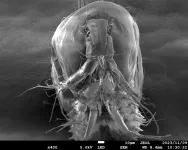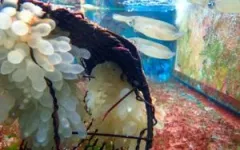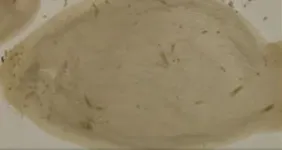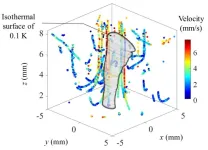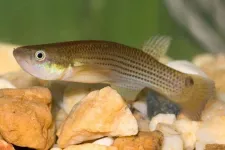(Press-News.org) Raising squid in aquaculture has been a challenge that researchers have tried to address for many decades without meaningful success. Squid are highly sensitive to changes in water flow, are vulnerable to disease, have complex life cycles and hard-to-meet food preferences, and can become aggressive towards each other, all of which make them difficult to rear. At the same time, the population of wild squid is plummeting due to overfishing and climate change, and in Japan alone, it’s estimated that the population of wild squid is just 10% compared to the 1980s. Amidst this situation, in 2022, a team of researchers at the Okinawa Institute of Science and Technology (OIST) has managed to create the most efficient cephalopod aquaculture system for research to date. With this system, they have managed to rear 10 successive generations of squid, an unparalleled achievement in the field.
And now, a serious threat has been identified and removed – or more accurately, treated. OIST researchers have recently discovered a new species of parasitic copepod, which was responsible for the death of a large proportion of squid eggs in the tanks, and they have also developed an eco-friendly treatment of these parasites. Their findings have now been published in Scientific Reports. “Disease management is the most important aspect of aquaculture” says co-author Dr. Zdenek Lajbner from the Physics and Biology Unit at OIST, led by Professor Jonathan Miller. Dr. Lajbner has been instrumental in the creation of the squid aquaculture program at OIST. “And I’m glad to see that we have managed to eliminate a serious threat to the health of squids.”
Unmasking a killer
While a new research aquaculture system without precedent is bound to encounter challenges, one problem kept persisting despite constant improvements to the system. “Only about 70% of the squid eggs hatched, and the young squids would often die within 1-3 days from damage and infection,” as Dr. Lajbner recalls. The cause remained elusive, until the unit was joined by Dr. Mehmet Arif Zoral, who, with his background in aquatic animal health, quickly determined the cause: “we found an infestation of parasitic copepods on the squid egg clutches, which were feeding on the eggs.”
Copepods are a group of crustaceans, and they come in many different forms: living freely in the ocean, forming symbiotic relationships with other species, or subsisting as parasites on or inside of other marine life. The species discovered in the experimental facility, scientifically named Ikanecator primus from the Japanese word for squid (‘ika’) and the Latin necator meaning murderer, lives on the squid eggs, chewing them up and breaking them down using a variety of enzymes, often leading to the death of the egg or premature hatching. Even if the egg did survive, the parasite was also observed latching onto hatchlings as they were exiting the egg, further damaging the young squids. In addition to the mechanical damage to the squids, they were also prone to bacterial infections, which the researchers speculate might also be triggered by the copepods.
“The copepods are very prolific,” explains Dr. Zoral. “Each female carries 50-60 eggs, and these eggs hatch within three weeks. The average incubation time for the squids is one month, meaning that you have many hundreds of copepods per squid egg clutch.” While squid eggs in aquaculture are especially vulnerable to infestations like this due to their proximity to one another, the copepods were also found on eggs retrieved from the wild.
United front
In addition to carefully describing the appearance and behavior of the copepods, the researchers also worked to help the hatchlings. They found an ally in peracetic acid (PAA), which is widely used in a variety of industries, from fish aquaculture to veterinary medicine and food processing. “We tested various solutions of PAA and found one that kills 100% of the parasites in under two minutes, with zero effect on the squids or their subsequent generations,” explains Dr. Zoral. Dr. Lajbner adds that “PAA is entirely biodegradable, unlike many of the treatments currently in use in Japan, like hypochlorite or boric acid, which are significantly more damaging to the environment.”
The discovery of the copepod and the creation of the eco-friendly treatment was a joint effort between fields, and between OIST and local fisheries. As Dr. Zoral puts it, “we combined three fields to make this discovery and treatment possible – aquaculture, veterinary science, and fundamental molecular biology.” Co-author Dr. Lucia Zifcakova adds that “we utilized the latest sequencing technologies to uncover the enzymatic composition of the copepods and successfully identified the specific enzymes they use to destroy cephalopod eggs.” The unit researchers were aided throughout their research by the OIST Core Facilities, who provided much of the experimental equipment that the scientists used to keep the squids and to identify and describe the copepods. The research unit also has a fruitful partnership with the local Onna Village Fisheries, and they have since cooperated with the Nago Fisheries as well, who provided the researchers with wild squids and their eggs from the East China Sea and assisted them throughout the study. “We hope to help cephalopod aquaculture systems across the world. For example, squids are often studied in neuroscience, and keeping the animals healthy is the top concern of researchers,” says Dr. Zoral.
The unit has now filed a patent for the PAA solution, and they are hoping to show through future research that the treatment is effective across cephalopod species, and for a variety of different parasite infections. “Aquaculture will never be perfected, as there will always be new disease or other complications to research and treat,” summarizes Dr. Lajbner, “but with advances in disease management like these, we’re happy to improve the health of squids in aquaculture.”
END
Eco-friendly treatment saves squid eggs from newfound parasite
New “squid killer” species of parasitic copepod has been described and successfully treated.
2024-07-22
ELSE PRESS RELEASES FROM THIS DATE:
Quit Googling and take naps to cut dementia risk, says AI expert
2024-07-22
People can reduce their risk of age-related dementia by exercising their brains properly instead of Googling, according to a leading Canadian academic.
Professor Mohamed I. Elmasry says simple daily habits such as afternoon naps, memory ‘workouts’ and not reaching for a smartphone can increase the odds of healthy aging.
His new book, iMind: Artificial and Real Intelligence (with foreword by Canadian cell biologist Dr. Aileen Burford-Mason), says the focus has shifted too far away from RI (natural, or real) intelligence in favor of ...
Duke-NUS launches LIVE Ventures, a S$20 million incubator to accelerate research commercialisation
2024-07-22
New incubator aims to tap industry experts to bridge the knowledge and funding gap to enhance bench-to-bedside success
LIVE Ventures provides up to $500,000 for high-potential academic research projects
Duke-NUS Medical School today launched LIVE Ventures, a S$20 million incubation programme designed to catalyse the commercialisation of innovative academic research. Focused on translating scientific breakthroughs into clinical applications, LIVE Ventures will provide Duke-NUS scientists conducting ...
Samuel Pepys’ fashion prints reveal his guilty pleasure: Fancy French clothes
2024-07-22
University of Cambridge media release
UNDER STRICT EMBARGO UNTIL 00:01AM (UK TIME) ON MONDAY 22ND JULY 2024
A collection of French fashion engravings offers precious new insights into the life of Samuel Pepys years after his premature final diary entry. The prints show the tailor’s son remained fascinated by the power of fashion long after he had secured wealth and status. But they also expose Pepys’ internal conflict over French style.
Most of what we know about Samuel ...
New genetic test will eliminate a form of inherited blindness in dogs
2024-07-22
Progressive retinal atrophy (PRA) is a group of inherited diseases that causes progressive degeneration of the light sensitive cells at the back of the eye. Dogs with PRA have normal sight at birth, but by the age of four or five they will be totally blind. There is no treatment.
Now a team led by the University of Cambridge has identified the genetic mutation that causes PRA in English Shepherd Dogs, and developed a DNA test for it. By identifying dogs carrying the disease before their eyesight starts to fail, this provides a tool to guide breeding decisions so the disease is not passed on to puppies.
Owners usually don’t realise their dog has PRA until it is ...
Cancer risk: Most Australian welders exposed to high levels of dangerous fumes
2024-07-21
New Curtin University research has revealed at least 46,000 Australian welders are exposed to high levels of dangerous, potentially cancer-causing fumes at work — and little is being done to protect them.
A joint Curtin School of Population Health and University of Sydney project funded through the Centre for Work Health and Safety, the Australian-first study was published today in the Australian and New Zealand Journal of Public Health.
The research team surveyed 634 workers and employers involved in welding from across Australia ...
Two-in-one mapping of temperature and flow around microscale convective flows
2024-07-20
Tokyo, Japan – Researchers from Tokyo Metropolitan University have devised a way to measure both the temperature and velocity profiles of fluid in a convective plume at millimeter length scales in 3D. They combined near-infrared absorption imaging and image processing to separate the motion of tracer particles from snapshots of how light is absorbed, producing both a smooth velocity and temperature map. The technology promises new insights into optimizing the design of micro-heating and cooling devices.
Accurate maps of how heat and matter flow at the microscale are vital to the design of micro-heating and cooling devices. A classic example ...
Texas A&M engineers explore intelligence augmentation to improve safety
2024-07-20
Artificial intelligence (AI) has grown rapidly in the last few years, and with that increase, industries have been able to automate and improve their efficiency in operations.
A feature article published in AIChE Journal identifies the challenges and benefits of using Intelligence Augmentation (IA) in process safety systems.
Contributors to this work are Dr. Faisal Khan, professor and chemical engineering department head at Texas A&M University, Dr. Stratos Pistikopoulos, professor and director of the Energy Institute, Drs. Rajeevan Arunthavanathan, Tanjin Amin, and Zaman Sajid from the Mary Kay O’Connor Safety Center.
Additionally, Dr. Yuhe ...
ORNL economist honored at international hydropower conference
2024-07-19
Researcher Rocio Uria-Martinez was named one of four “Women with Hydro Vision” at this year’s HYDROVISION International 2024 conference taking place in Denver this week. Awarded by a committee of industry peers, the honor recognizes women who use their unique talents and vision to improve and advance the worldwide hydropower industry.
Uria is an energy and environmental economist and senior R&D staff member at the Department of Energy’s Oak Ridge ...
UCLA selected by Centers for Medicare & Medicaid Services to test Medicare dementia care model
2024-07-19
UCLA has been selected by the Centers for Medicare & Medicaid Services (CMS) to participate in a new Medicare alternative payment model designed to support people living with dementia and their caregivers.
UCLA is one of almost 400 participants building Dementia Care Programs (DCPs) across the country working under CMS’ Guiding an Improved Dementia Experience (GUIDE) Model to increase care coordination and improve access to services and supports, including respite care, for people living ...
Fish adjust reproduction in response to predators
2024-07-19
Some species of fish can evolve their egg-laying habits in response to predators in the area in order to survive, according to new research from The University of Texas at Arlington.
It has long been observed that organisms modify their traits, including reproductive patterns, in response to changes in their environment. This type of evolutionary plasticity has been observed in many types of animals in different habitats and with varying predators.
“We knew that fish who laid their eggs externally often adapted depending on the predators in the area, but we did not know how quickly species could change to these externals pressures,” said biology Professor Matthew Walsh, ...
LAST 30 PRESS RELEASES:
A kaleidoscope of cosmic collisions: the new catalogue of gravitational signals from LIGO, Virgo and KAGRA
New catalog more than doubles the number of gravitational-wave detections made by LIGO, Virgo, and KAGRA observatories
Antifibrotic drug shows promise for premature ovarian insufficiency
Altered copper metabolism is a crucial factor in inflammatory bone diseases
Real-time imaging of microplastics in the body improves understanding of health risks
Reconstructing the world’s ant diversity in 3D
UMD entomologist helps bring the world’s ant diversity to life in 3D imagery
ESA’s Mars orbiters watch solar superstorm hit the Red Planet
The secret lives of catalysts: How microscopic networks power reactions
Molecular ‘catapult’ fires electrons at the limits of physics
Researcher finds evidence supporting sucrose can help manage painful procedures in infants
New study identifies key factors supporting indigenous well-being
Bureaucracy Index 2026: Business sector hit hardest
ECMWF’s portable global forecasting model OpenIFS now available for all
Yale study challenges notion that aging means decline, finds many older adults improve over time
Korean researchers enable early detection of brain disorders with a single drop of saliva!
Swipe right, but safer
Duke-NUS scientists identify more effective way to detect poultry viruses in live markets
Low-intensity treadmill exercise preconditioning mitigates post-stroke injury in mouse models
How moss helped solve a grave-robbing mystery
How much sleep do teens get? Six-seven hours.
Patients regain weight rapidly after stopping weight loss drugs – but still keep off a quarter of weight lost
GLP-1 diabetes drugs linked to reduced risk of addiction and substance-related death
Councils face industry legal threats for campaigns warning against wood burning stoves
GLP-1 medications get at the heart of addiction: study
Global trauma study highlights shared learning as interest in whole blood resurges
Almost a third of Gen Z men agree a wife should obey her husband
Trapping light on thermal photodetectors shatters speed records
New review highlights the future of tubular solid oxide fuel cells for clean energy systems
Pig farm ammonia pollution may indirectly accelerate climate warming, new study finds
[Press-News.org] Eco-friendly treatment saves squid eggs from newfound parasiteNew “squid killer” species of parasitic copepod has been described and successfully treated.
